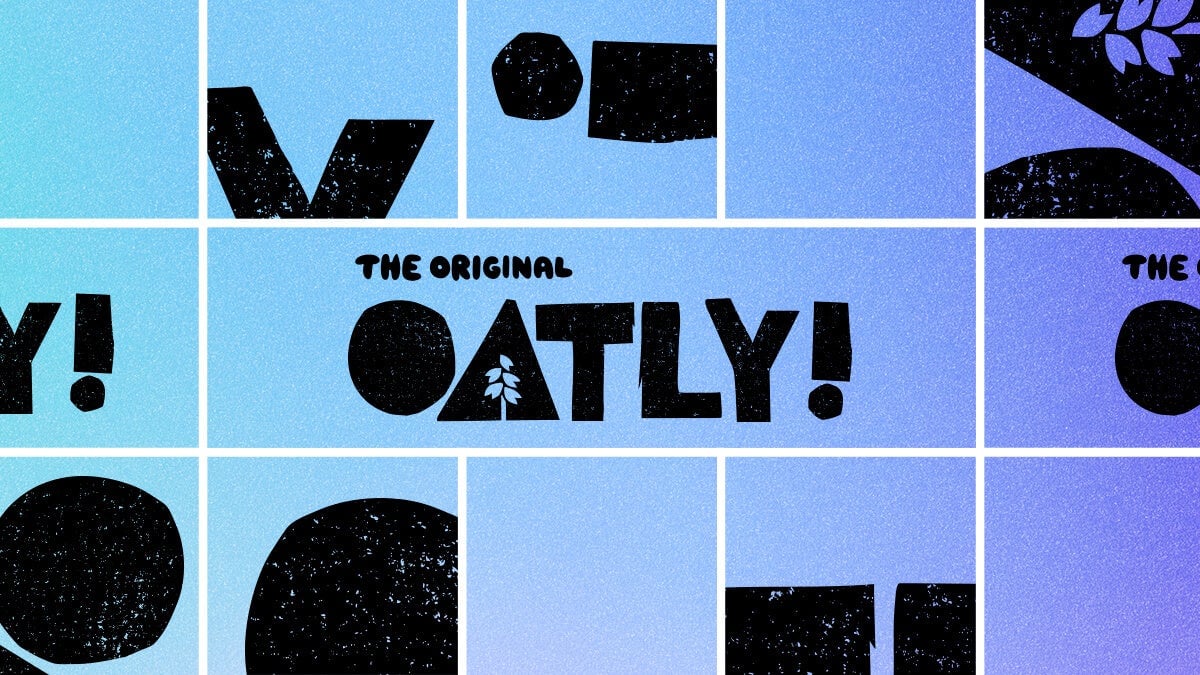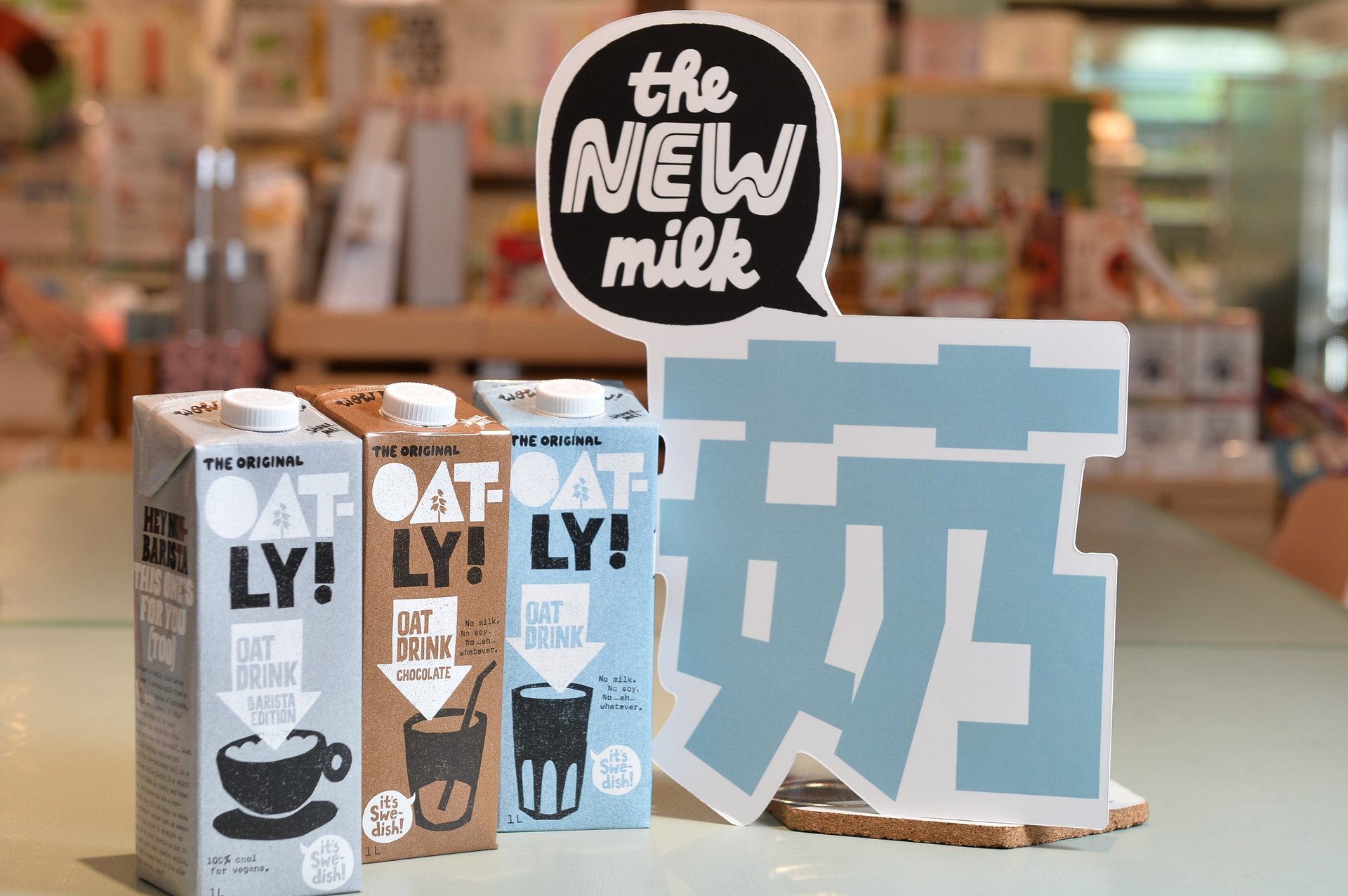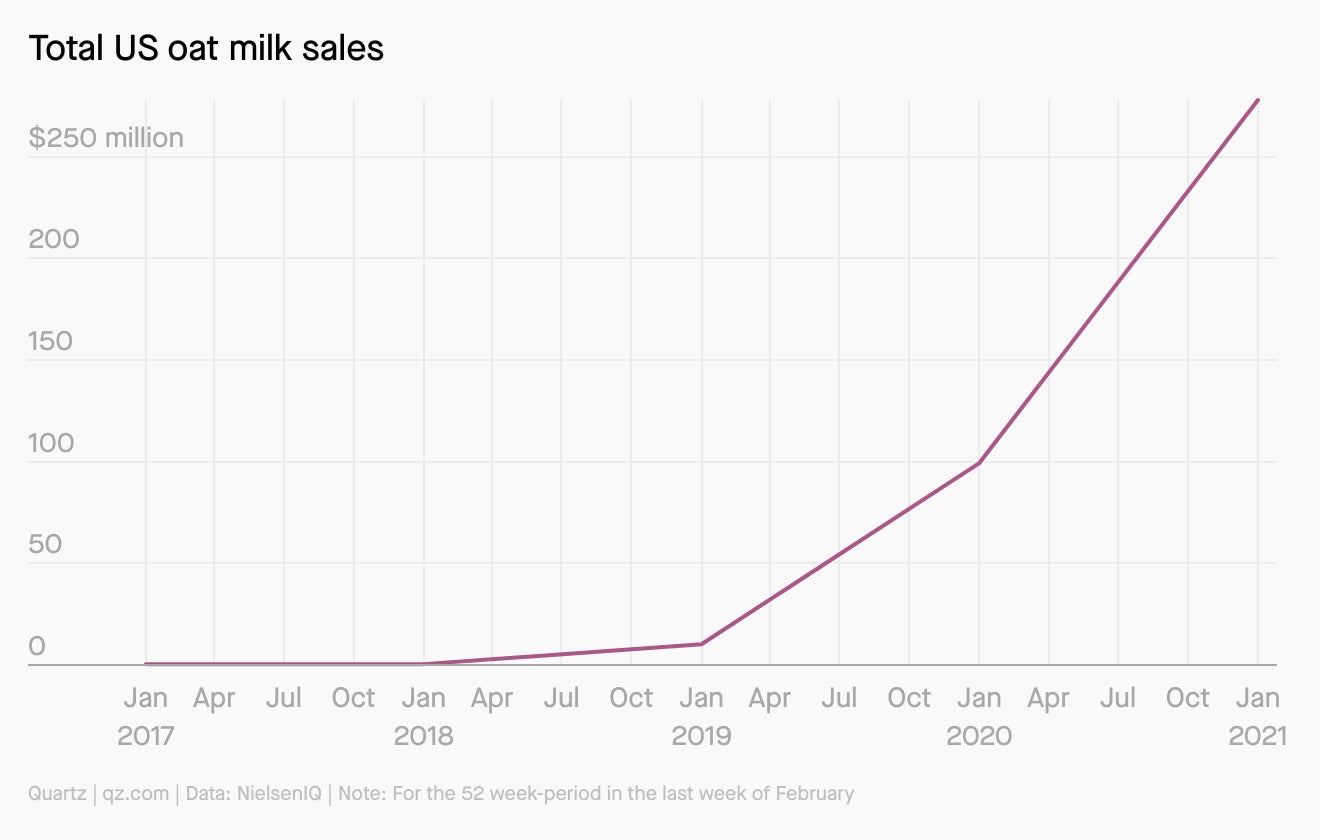For members—Oatly is milking it
Hi Quartz member,



Hi Quartz member,
It’s 8am on a Monday, and you’re settling in to enjoy a bowl of cereal and a cup of coffee. Thing is, you’re trying to cut back on dairy, for reasons both personal (indigestion) and environmental (carbon emissions). Fortunately, there’s no need to touch a drop of cow juice—like millions of consumers around the world, you’re converting to plant-based Milk Alternatives. And one of them stands above the rest: Oatly, a Swedish company that has transformed oat milk from a soy milk also-ran into a $10 billion business.
But first, a recap: AMC Theatres got a lifeline from Godzilla vs. Kong, a brand boycott pushed up the resale price of Chinese sneakers, and Jamie Dimon shared Thoughts on the future of remote work. Google won a battle (but not the war) to make APIs fair use, and Will.i.am is selling a $300 face mask. What will 80,000 store closings do to the future of US retail? Why does America need a $112,000 electric Hummer? Should you laminate your vaccine card? Asked and answered.
Your most-read story this week: How the pandemic pummeled the world’s most famous shopping streets (🚗 an interactive experience!) And most relatable member goes to everyone mourning the death of Yahoo! Answers as much as we are. RIP forever, collegial version of the internet.
Okay, now wipe off that milk mustache and grab a fresh carton. We’re talking about Oatly.
Sowing wild oats
“Oatly has crossed the line from hip to basic,” Bloomberg food reporter Deena Shanker recently declared on Twitter. That may be a diss, but it’s also a testament to the 27-year-old Swedish oat milk company, which counts Oprah, Jay-Z, and Natalie Portman among its investors. When you’ve got an upcoming IPO with a rumored $10 billion valuation, who needs cool anyway?
Oatly has been around since 1994, when Swedish food scientist Rickard Öste developed the dairy substitute while researching lactose intolerance. But the brand started making a real splash after CEO Toni Petersson took the helm in 2012. Petersson led a redesign of Oatly’s packaging and advertising, and the company’s updated vibe—quirky-yet-progressive, with slogans like “No milk. No soy. No badness.”—proved appealing to three oft-overlapping demographics: environmentally conscious consumers (who like that Oatly is vegan and produces fewer emissions than dairy milk), foodies (who enjoy its creamy texture in their lattes), and youthful types (who are drawn to brands that don’t take themselves too seriously).
Today, Oatly also sells oat-based ice cream, yogurt, and whipped-cream substitutes, and its products are available in 20 countries. The brand made the jump to the US in 2016 by partnering with hip coffee shops like Intelligentsia and La Colombe, and after deploying a similar strategy in Hong Kong in 2016, has since expanded to mainland China. (Oatly also landed in US Starbucks locations this year.) Oatly’s global sales hit $200 million in 2019, up 82% year-over-year. The company expected sales to double in 2020, though it has yet to disclose final figures.
Meanwhile, oat milk has in the US become the second-most popular plant-based milk by sales. To keep up with demand, Oatly recently announced two new plants; one, opening in the UK’s Peterborough in 2023, will be capable of producing up to 450 million liters (119 million gallons) of oat milk per year. The company is also opening a $30 million plant in Singapore—its first outside of Europe and North America—in partnership with local food and beverage manufacturer Yeo Hiap Seng, setting it up to expand distribution in China and enter other parts of Asia.
Helping to fuel this growth is the $200 million stake (worth about 10% of the company) that Oatly sold last year to a group of investors led by private equity firm Blackstone. It was an “unexpected choice” of partner, as Oatly acknowledged, given Blackstone’s alleged environmental track record. But the sale helped set up Oatly to confidentially file for an IPO in February. Citing that IPO, the company declined comment.
6x: Amount of water required by almond crops vs. oat crops
65%: Portion of the global population with some degree of lactose intolerance
180%: Year-over-year growth in oat milk sales (by dollars) in the US, according to NielsenIQ data for the week ended Feb. 27
750,000: Gallons of oat milk produced per month at Oatly’s Millville, New Jersey, plant
£73 million: Oat milk sales in the UK in 2020 ($100 million)
£3.5 billion: Cow milk sales in the UK in 2020 ($4.38 billion)
Free advertising
One of the ways Oatly stands out is with a distinctive brand voice: self-deprecating and no-bullshit, kind of like the sarcastic guy in your college film class whose T-shirts always looked a little dirty. Here are a few of the sassy slogans Oatly is known for:
- “It tastes like shit!” —a direct quote from a dissatisfied customer, reprinted on Oatly cartons with pride
- “I totally hated that Oatly commercial” —an Oatly t-shirt dedicated to viewers enraged by the company’s 2021 Super Bowl ad, which featured Petersson singing tunelessly about oat milk in a field
- “May cause total boredom, just like normal yogurt.” —street ads touting Oatly’s new yogurt: oatgurt

How dairy you
Oatly’s most popular catchphrase—“Like Milk, But Made for Humans”—has generated controversy over the years. The company was sued by the Swedish Dairy Association for implying that cow’s milk is unhealthy, and lost the case in 2015. In Sweden, Oatly isn’t allowed to call its product milk at all.
In 2019, the European Trademark Office also denied Oatly a trademark for its catchphrase, finding that the slogan wasn’t sufficiently distinctive. Oatly finally won that battle in January 2021; in its rather complimentary ruling, the EU General Court wrote that the phrase “calls into question the commonly accepted idea that milk is a key element of the human diet” in a way that is “original, imaginative, paradoxical, surprising, thought-provoking, and unexpected and is therefore capable of performing the essential function of a trademark.”
But tensions between Oatly and the dairy industry go deeper than a simple slogan. In Sweden, European dairy company Arla took out ads against alternative milk products that were clear stand-ins for Oatly, referring to it via made-up words like pjölk and brölk, similar to the Swedish word for milk (mjölk). Oatly shrugged off the insult by slapping the words on its packaging, and has returned fire with a campaign calling on Swedes to “flush the milk” for the good of the planet.
Now Oatly is fighting off a proposed rule in the EU that could prevent it and other plant-based alternatives from using terms or imagery reminiscent of dairy (like “creamy”), or from packaging their products in shapes evocative of milk-based products. The basis of the rule is that consumers might not be able to tell the difference between dairy and vegan products, an assumption Oatly is challenging with an ad that declares, “As it turns out, people are not stupid.”
Fun fact
Oatly created its own Chinese character for vegan milk, featuring the symbol for grass atop the symbol for milk. The company opted not to trademark the character, which translates to “plant milk,” saying it could be applied to any kind of plant-based alternative.

The great Oatly shortages
Demand for Oatly has led to several shortages, including one in 2018 that prompted some Amazon sellers to hawk it for up to $200 per carton. The company didn’t stress it: The New Yorker quoted Oatly’s then-general manager (now president of its North America operations) saying occasional shortages let “the humanness of the company come through.”
Oat milk’s long shelf life also led to a run on the product early in the pandemic, with sales up 323% in the last week of February 2020 compared to the year before. (Sales of hand sanitizer rose 313% over the same period.)
Today, another Oatly shortage is upon us: Bloomberg reported in March that demand is outstripping supply in the US after Covid-19 forced Oatly to delay the planned opening of a plant in Utah last year. But relief is in sight: The plant is expected to start production within the next few months.

Final thought
If Oatly’s success suggests it’s now too mainstream to be considered hip, that means it’s time to start casting about for the next big thing in alternative milks. Pistachio milk, we’re looking at you.

Keep learning:
- Oatly’s path to alt-milk world domination starts in New Jersey (Bloomberg)
- Can a burger help solve climate change? (The New Yorker)
- No cow necessary: Here’s how to make plant-based milk (New York Times)
- The milk situation (New York Times)
- Against the grain (Monocle)
- Sweden’s ‘Milk War’ is getting udderly vicious (The Outline)
Thanks for reading! And don’t hesitate to reach out with comments, questions, or companies you want to know more about.
Best wishes for an alternative end to your week,